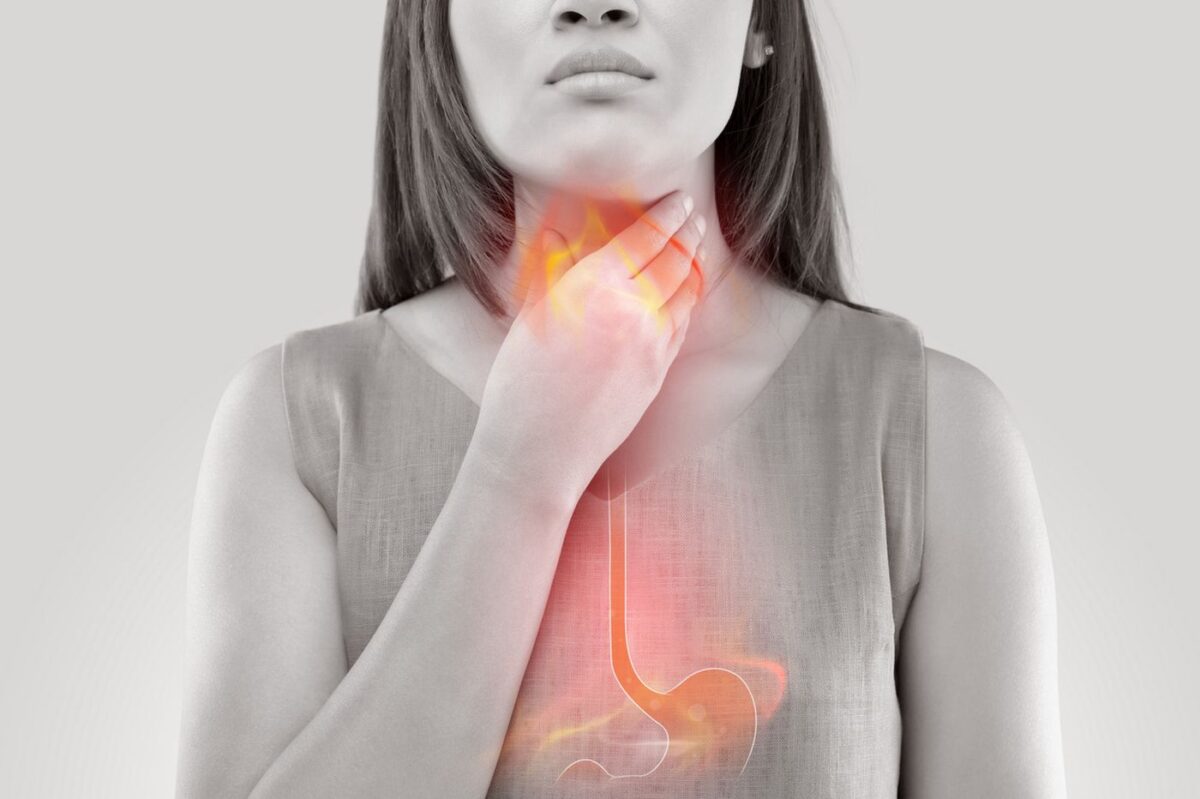
Many patients report a burning sensation that starts low but reaches their throat. They often describe it as starting from the chest and climbing up, especially after meals. Sometimes it’s subtle, more of a discomfort than sharp pain, but it draws attention. This sensation usually worsens when lying down or bending over shortly after eating. It may come with a sour taste or simply a feeling that something is climbing upwards. In people with gastroesophageal reflux disease (GERD), this rising burn is not limited to the esophagus. Over time, acid and digestive enzymes can reach the throat and even the vocal cords. These areas are far more sensitive than the esophagus and react quickly to irritation. The result is not just heartburn but persistent throat discomfort that patients can’t easily explain. What begins as mild reflux can evolve into chronic throat inflammation, hoarseness, and coughing.
The throat becomes inflamed even if acid doesn’t always cause heartburn
The throat becomes inflamed even if acid doesn’t always cause heartburn. This disconnect is why many people don’t realize GERD is affecting them. While typical reflux causes chest pain or a burning sensation, throat-based symptoms often feel completely different. Some patients report a scratchy throat that never seems to go away. Others complain about a constant need to clear their throat, especially in the morning. A condition called laryngopharyngeal reflux (LPR) is usually the culprit. Unlike traditional GERD, LPR can occur without noticeable heartburn at all. In these cases, the acid mist reaches the throat silently, usually during sleep. This silent damage leads to inflammation, swelling, and a persistent feeling of something stuck in the throat. The lining of the throat isn’t designed to withstand this exposure, so it becomes irritated very quickly. Without identifying the source, many chase wrong treatments like antibiotics or allergy pills.
Some people lose their voice without knowing why it’s happening
Some people lose their voice without knowing why it’s happening. They wake up hoarse or find their voice fading by the end of the day. This is especially common in people who talk a lot, like teachers, singers, or customer service professionals. They may believe it’s due to overuse or seasonal allergies. In reality, acid creeping up from the stomach may be coating their vocal cords during sleep. When that happens repeatedly, it wears down the vocal fold tissues and creates inflammation. This inflammation doesn’t always cause pain—it just reduces vocal clarity and power. Over time, speaking becomes effortful, and high-pitched tones become difficult to reach. Speech therapy may help, but without managing the reflux, the problem persists. Many individuals go months or years before realizing the root cause isn’t vocal strain, but something happening deep inside the digestive tract. Identifying the reflux component early makes treatment easier and recovery faster.
Coughing without illness may signal acid rising during the night
Coughing without illness may signal acid rising during the night. Chronic coughs that don’t respond to antibiotics or allergy medications often have another source. In GERD or LPR cases, acid can backflow while a person sleeps. Because there is less swallowing during sleep, there’s nothing to push the acid back down. The acid then reaches the back of the throat and causes a reflexive cough. This cough isn’t wet or productive—it’s dry, sudden, and irritating. It might wake the person or happen early in the morning. Over time, this becomes habitual, even when reflux isn’t present. The airways grow hypersensitive due to repeated exposure. Unlike a cold or flu, there are no fevers or congestion. Just a stubborn cough that never goes away. Many patients see multiple doctors before GERD is considered as the cause. Awareness of nighttime reflux is essential for early intervention and symptom control.
Medication doesn’t always solve throat symptoms linked to reflux
Medication doesn’t always solve throat symptoms linked to reflux. Proton pump inhibitors (PPIs) and H2 blockers reduce stomach acid, but they don’t stop the physical reflux. Reflux can still occur; it’s just less acidic. However, non-acid components like pepsin and bile may still reach the throat. These substances can be just as damaging, especially with prolonged exposure. That’s why some people don’t feel better even after weeks of medication. Lifestyle changes play a significant role in managing symptoms. Elevating the head of the bed helps prevent nighttime reflux. Avoiding heavy meals before bedtime reduces risk as well. Limiting caffeine, alcohol, and chocolate can also ease symptoms. Wearing loose clothing around the waist and avoiding large meals are other effective strategies. When medication alone fails, a combined approach often works best. Treating LPR or throat-based reflux requires more than just suppressing acid—it demands full-body awareness and habit adjustments.
Postnasal drip can make reflux symptoms worse without being the cause
Postnasal drip can make reflux symptoms worse without being the cause. This condition causes mucus to collect at the back of the throat. When combined with acid or pepsin from the stomach, irritation increases. Patients may feel like their throat is coated or constantly congested. They may believe allergies or sinus issues are the main issue, leading them to seek nasal sprays or antihistamines. However, these treatments often don’t help if reflux is present. Instead, the trapped mucus holds acidic particles in place, prolonging contact with the throat lining. This intensifies inflammation and increases the urge to clear the throat. Repeated throat clearing then leads to vocal strain and further irritation. It becomes a cycle: reflux aggravates mucus production, and mucus worsens reflux symptoms. Breaking the loop requires addressing both causes, not just one. For many patients, recognizing this interaction becomes a turning point in treatment.
Throat tightness may come from muscles reacting to chronic reflux
Throat tightness may come from muscles reacting to chronic reflux. This tightness doesn’t feel like choking, but more like pressure or a lump. Some describe it as a golf ball in their throat or a band around the neck. It doesn’t usually interfere with swallowing, but it creates constant discomfort. This feeling is often called “globus sensation” and is common in people with GERD or LPR. It’s caused by subtle muscle contractions in response to irritation. These contractions are involuntary and driven by the body’s attempt to protect sensitive tissues. Unfortunately, the response only creates more tension. Swallowing becomes more conscious, and anxiety often follows. Many patients believe they have a serious blockage, but imaging and exams show nothing physical. Treatment involves calming the muscles, reducing reflux, and managing stress. Addressing only one factor rarely brings full relief. It’s the layered response of body and mind that must be untangled.
Swallowing difficulty might be due to narrowing caused by repeated exposure
Swallowing difficulty might be due to narrowing caused by repeated exposure. In some GERD cases, acid causes long-term damage to the esophagus. Scar tissue forms, making the passage for food tighter and less flexible. This condition is known as esophageal stricture. It usually starts with a sense that food is getting “stuck,” especially solid foods like bread or meat. People start to chew more slowly or avoid certain textures. Some rely on liquids to help push food down. Over time, this impacts nutrition and meal enjoyment. Doctors use endoscopy to examine the esophagus and may perform dilation to open the passage. However, this solution isn’t permanent if reflux remains uncontrolled. Continued acid exposure will eventually cause the narrowing to return. The most effective path is long-term management through diet, medication, and behavioral changes. Recognizing swallowing difficulty early can prevent further complications and restore confidence at the table.
Many don’t realize that acid isn’t always felt as a burn
Many don’t realize that acid isn’t always felt as a burn. Not every reflux episode causes that classic burning in the chest. Some people experience no discomfort in the stomach or esophagus at all. Instead, their symptoms appear in the throat—hoarseness, coughing, throat clearing, or vocal fatigue. These symptoms can be dismissed as minor or unrelated. But without the burning clue, GERD goes undetected for longer. The result is delayed diagnosis and prolonged damage. Understanding that acid can harm without heat is key. Doctors must look beyond heartburn when evaluating chronic throat complaints. Patients should share every symptom, even ones they think are unrelated. A complete picture helps uncover silent reflux that hides in plain sight. Education about atypical symptoms leads to better outcomes. GERD isn’t just a stomach issue—it’s a full-body experience with many faces.
